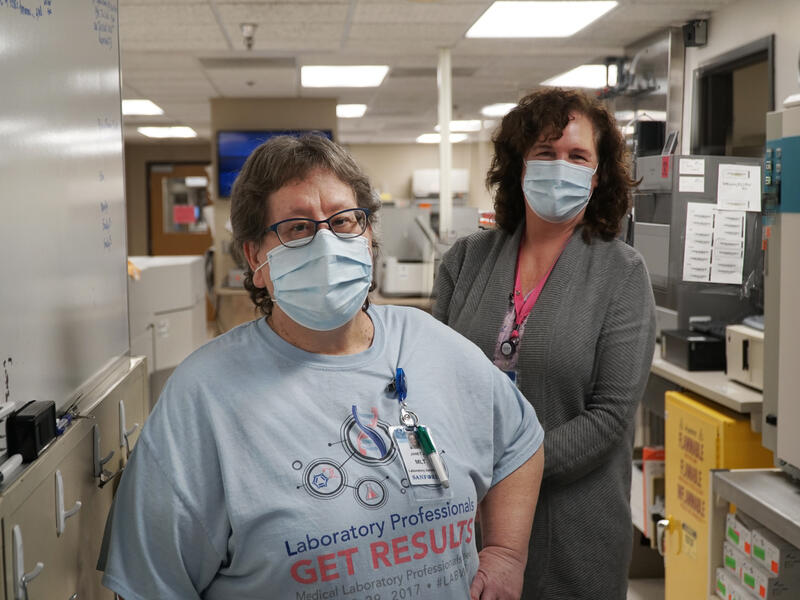Janet Jensen learned the importance of keeping a healthy heart the hard way.
She’s hoping other women don’t have to.
Find a doctor: Heart care providers at Sanford Health
‘Why can’t I breathe?’
Jensen is a medical lab technologist at Sanford Health in Bemidji, Minnesota. She and Sanford Health medical laboratory scientist Tammy Krzoska have worked together virtually every day for years.
“We’re both older, mature, our kids are raised, we have grandkids. We have a lot in common,” said Krzoska.
They’re so close, they know when something is wrong with the other.
It was midnight. Krzoska was packing up to leave for the night. As she went into the break room, she noticed Jensen was “slumped over the table.”
“I asked her if she was okay, and she said she couldn’t breathe,” Krzoska said.
After working together for five years, Krzoska knew Jensen had asthma. However, this was different.
“My chest felt so tight, I couldn’t even get a breath from my inhaler,” said Jensen.
When asked if she was fearful that moment, Jensen laughed and said, “I was more mad at my body. Why won’t you work? Why can’t I breathe? I guess I’m stubborn.”
Atypical symptoms
Gregory Schuchard, M.D., is an interventional cardiologist and says a tightness in the chest is a telltale sign of a heart attack.
More: Yoga instructor’s scare an example of heart attack in women
However, he does say that women often have different symptoms of a heart attack than men.
“It’s a big problem that’s been identified. Women often don’t present typical symptoms. They write it off as something that’s not heart related. Some non-activity related symptoms include arm pain, jaw pain, and decreased exercise tolerance,” said Dr. Schuchard.
“We’re prone to that so we don’t notice it,” added Jensen.
Thankful for friendship
Luckily, the wing where Jensen and Krzoska work is only 50 feet away from the emergency room.
Krzoska ran to the ER, and got Jensen the help she was in desperate need of.
While Jensen was being helped, Krzoska didn’t leave Jensen’s side.
“Tammy stayed with me for three hours,” said Jensen.
If Jensen wasn’t thankful for Krzoska before, she is now. She says if Krzoska hadn’t been there, she’s not sure if she’d be alive.
“I am so, so grateful for Tammy. Not only me, but when my girls talk about it, they almost go into tears. They want to meet and thank Tammy very badly,” said Jensen.
“If she would’ve walked outside and collapsed, she wouldn’t have made it. If she tried to drive home, she wouldn’t have made it,” said Krzoska.
A plea of awareness
Jensen realizes how close of a call she had. If there’s anything she wants, it’s for other women to realize this could happen to them.
“Always go in for your yearly check-ups. Monitor your blood pressure. Be at peace, and don’t stress out about everything. Stress is the big killer. We just need to learn to let it go.
“Don’t let yourself get overweight in the first place. Stay active.”
Jensen says she’s feeling “really good.” She says her medication is helping. She’s bought a bicycle chair, is more active, and following a healthier diet.
Learn more
- You can start preventing heart disease at any age
- COVID-19 FAQs: What should heart and stroke patients know?
- Friend’s heart attack signs help woman survive own ordeal
…
Posted In Bemidji, Heart, People & Culture, Women's
